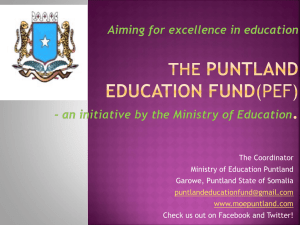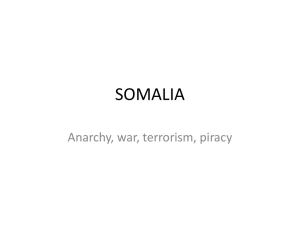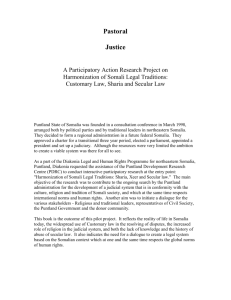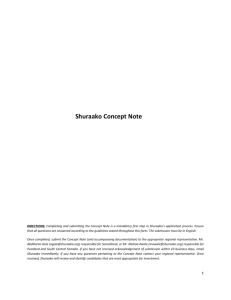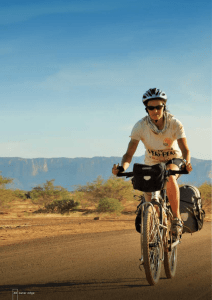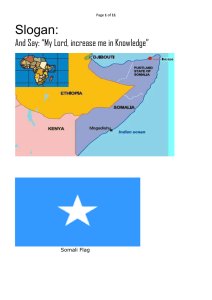Environmental degradation
advertisement
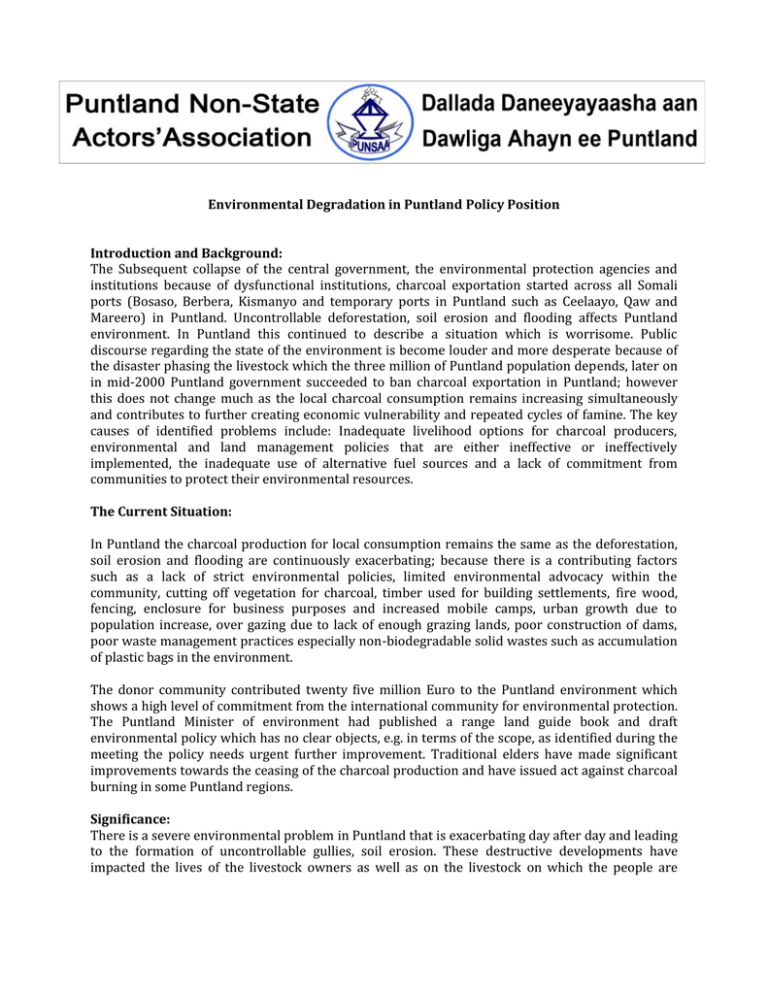
Environmental Degradation in Puntland Policy Position Introduction and Background: The Subsequent collapse of the central government, the environmental protection agencies and institutions because of dysfunctional institutions, charcoal exportation started across all Somali ports (Bosaso, Berbera, Kismanyo and temporary ports in Puntland such as Ceelaayo, Qaw and Mareero) in Puntland. Uncontrollable deforestation, soil erosion and flooding affects Puntland environment. In Puntland this continued to describe a situation which is worrisome. Public discourse regarding the state of the environment is become louder and more desperate because of the disaster phasing the livestock which the three million of Puntland population depends, later on in mid-2000 Puntland government succeeded to ban charcoal exportation in Puntland; however this does not change much as the local charcoal consumption remains increasing simultaneously and contributes to further creating economic vulnerability and repeated cycles of famine. The key causes of identified problems include: Inadequate livelihood options for charcoal producers, environmental and land management policies that are either ineffective or ineffectively implemented, the inadequate use of alternative fuel sources and a lack of commitment from communities to protect their environmental resources. The Current Situation: In Puntland the charcoal production for local consumption remains the same as the deforestation, soil erosion and flooding are continuously exacerbating; because there is a contributing factors such as a lack of strict environmental policies, limited environmental advocacy within the community, cutting off vegetation for charcoal, timber used for building settlements, fire wood, fencing, enclosure for business purposes and increased mobile camps, urban growth due to population increase, over gazing due to lack of enough grazing lands, poor construction of dams, poor waste management practices especially non-biodegradable solid wastes such as accumulation of plastic bags in the environment. The donor community contributed twenty five million Euro to the Puntland environment which shows a high level of commitment from the international community for environmental protection. The Puntland Minister of environment had published a range land guide book and draft environmental policy which has no clear objects, e.g. in terms of the scope, as identified during the meeting the policy needs urgent further improvement. Traditional elders have made significant improvements towards the ceasing of the charcoal production and have issued act against charcoal burning in some Puntland regions. Significance: There is a severe environmental problem in Puntland that is exacerbating day after day and leading to the formation of uncontrollable gullies, soil erosion. These destructive developments have impacted the lives of the livestock owners as well as on the livestock on which the people are dependent for their living and livelihood. If the problem is not addressed soon the poverty level will get worse and the Puntland population’s lives will be greatly affected. PUNSAA intervention: In January of 2014, The Puntland Non-State Actors Association (PUNSAA) organized a 3-day environment conservation advocacy consultation meeting which brought together seventy five people from all sectors of society such as women’s groups, professionals, youth organizations, traditional elders and religious leaders. The broad based consultation meeting is aimed to discuss policy issues in the advocacy strategy and produce policy positions and influence work plans, the meeting also aimed at sensitizing people about the worrying matter of environmental degradation in Puntland in order to create awareness about the impact about the degradation and the importance of conservation and biodiversity. In this thematic working group consultation meeting, PUNSAA adopted a position paper expressing the concerns and recommendations as well as commitments from all the participating organizations. Statement of the position of PUNSAA Charcoal use should be banned in all the eight regions of Puntland. There should be alternative sources of energy for cooking and other needs of consumption. The ministry of environment should finalize the environmental protection policy increasing its scope. Environmental protection commission should be established compromising traditional elders, Ulima, environmental experts and graduates. Environmental protection policy should be added to the Puntland education curriculum. Recommendations: There is a role to play for everyone. The government of Puntland should develop educational programs that are aimed at not only educating people but also encouraging community efforts to collectively find durable solutions. The government should support and enforce legislation to strengthen consumer rights, especially to ensure environmentally sustainable, safe and healthy products, and establish the "right to know" laws which enable people to make informed consumption choices. The government must also establish or strengthen relationships with the civil society through regular consultations on designing and evaluating development plans, programs and projects aimed at environmental conservation. All environment projects or programs must assess population needs within the context of sustainability, including where and how demographic pressures are interacting most with natural resources and ecologically sensitive areas, i.e., including population-environment dynamics such as: soil erosion and desertification; deforestation; water scarcity; urbanization; extinction of species from habitat destruction; and coastal resource depletion due to increased demands for water, and housing, and unsustainable fishing. Training and empowering the youth and school teachers with environmental techniques such as planting trees in education centers, hospitals and road sides is highly encouraged. The development and enactment of the Puntland Environmental Protection and Natural Resources Management Act is highly recommended. Equally important is the compliance and enforcement of environmental regulations and the integration of environmental considerations into the Puntland State policies in plans and programs. The establishment of strong institutions those who review environmental policies, act as Monitoring and Evaluation for environmental activities such as NEMA in co-ordination with the involved ministries and build national environmental conservation clubs including the traditional elders based in throughout the regions in Puntland that monitors and evaluates the environmental management activities and implements policies in co-ordination with the involved line ministries. The creation of public awareness of environmental issues and social mobilization campaigns through different local media such as FM radios, local TVs and newspapers on the use of harmless alternative energy sources which replaces the use of charcoal should be encouraged. Even more important is the application of the knowledge at all levels of society. For example at school level the conservation of the environment should be systematically encouraged in the school curriculum as a means of civic education to increases the number of knowledgeable, supporters sympathizers and well-wishers of the environment.
